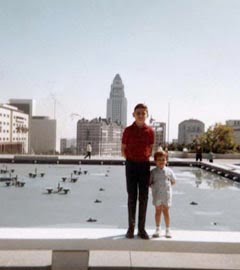
A WWII soldier on leave in front of the LA Post Office Terminal Annex, back of the photo reads "March 15, 1943"
Bukowski’s bungalow in East Hollywood – I wonder if my writing would improve if I lived here ?

Charles Bukowski, a German born poet, short story author, novelist and Los Angeles High School graduate (class of 1939) is as much an icon as any creative soul of the last century. Once called the “poet laureate of the lowlife”, Bukowski wrote in an auto-biographical style using his alter-ego, Henry Chianski to portray his real life beatnik adventures of wine, women and debauchery in downtown and East Hollywood neighborhoods. His first novel, “Post Office” published in 1971 follows the story of the protagonist Henry Chianski, as he becomes a substitute mail carrier and then later a full time mail clerk at the Los Angeles Post Office Terminal Annex located on Alameda Street in downtown Los Angeles. The story echoes the author’s plunge into the world of punching a clock for a living, allowing him to pay the rent while he put pen to paper, whiskey to lips and producing some of the best literary works of a generation.
A few years ago there was a movement to give historical-cultural landmark status to Buk’s one time Hollywood bungalow located at 5124 De Longpre Ave where he lived from 1963 to 1974. “Post Office” was penned at this location in between stints of womanizing and boozing, paving the way for his 1978 novel, “Woman” which takes place at the funky bohemian Spanish bungalow court. The effort for landmark status was bitterly disputed by passionate Bukowski fans, who did not want his memory commercialized, but they eventually lost the battle and a “Bukowski Court” sign now stands on the street which is also the flagship stop of a bus tour celebrating the late poet’s haunts. I realize I am not the first to think of it but the ultimate and most ironic celebration to his life would be renaming the post office where he worked during some of his many creative peaks to the “Charles Bukowski Los Angeles Post Office Terminal Annex”.
His novel, "BarFly" was made into the 1987 film starring Mickey Rourke as the ever compelling Henry Chianski and Faye Dunaway as his drinking partner and love interest, Wanda. In the opening credits of the film you can see several dive bars that Bukowski frequented in the MacArthur Park and East Wilshire neighborhoods of Los Angeles. Many of these bars are long gone today. Look closely and you will see Buk as he sits at the bar during one of the bar scenes in his only cameo appearance.
Buk…if you are reading this somewhere, your prose continues to inspire me and can you please check my grammar and spelling, the next round is on me.



No comments:
Post a Comment